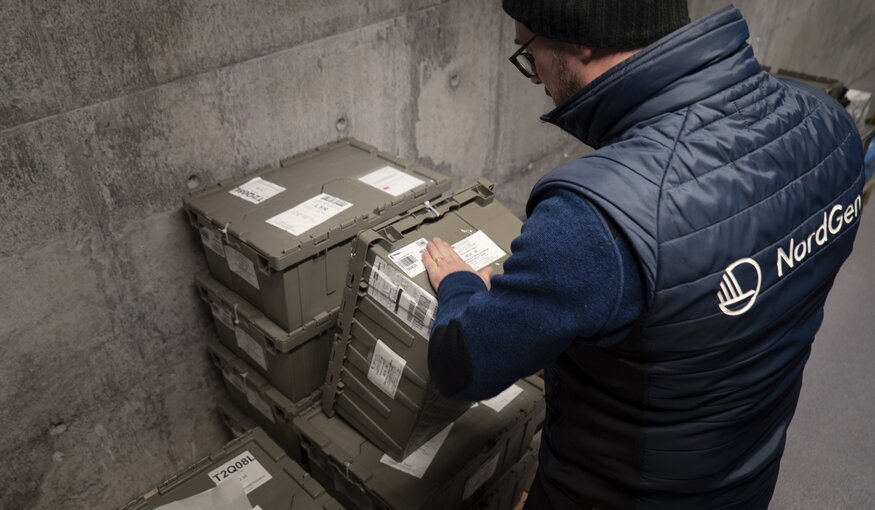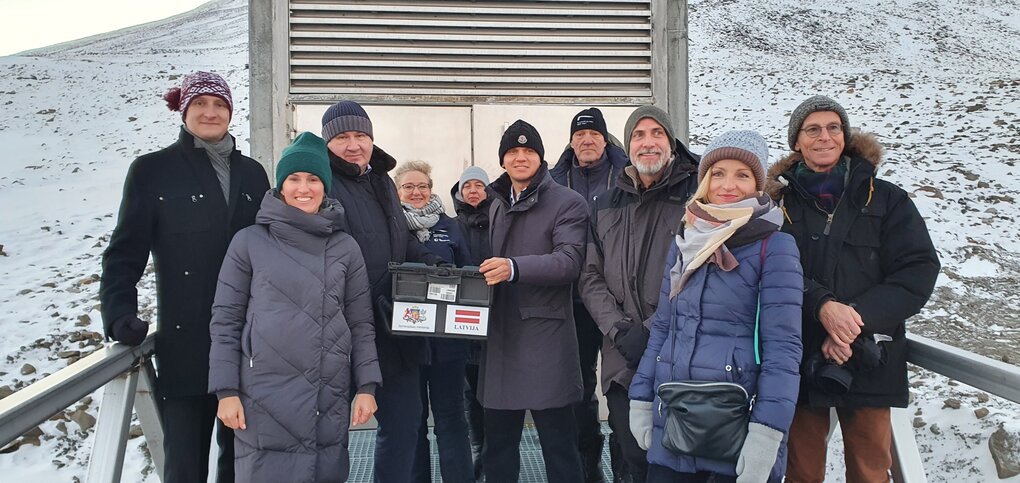Svalbard Global Seed Vault Reopens for Final Deposit of 2021

- In this deposit, 14,011 seed samples are being added from 12 genebanks from around the world.
- Latvia and Serbia are depositing seeds for the first time.
- The International Maize and Wheat Improvement Center (CIMMYT) remains the largest contributor to the Fault, with 177,850 seed samples safeguarded.
- The total number of seeds in the Vault is now 1,125,416.
BONN, October 28, 2021 – The Svalbard Global Seed Vault has unlocked its doors once again this week to welcome 50 boxes containing 14,011 seed samples, bringing the total in the vault to 1,125,416.
For the first time ever, genebanks in Serbia and Latvia are depositing seeds, joining the 87 other depositors that have backed-up precious crop diversity in the Arctic permafrost since the Seed Vault opened in 2008.
“This diversity we’re depositing is a beautiful representation of Latvian agriculture and heritage,” says Dainis Ruņģis, the manager of Latvia’s Genetic Resource Center/LMVI 'Silava’, which is depositing 153 seed samples. Although mainly staples like barley, wheat and flax, the deposit includes some rarer crops, too. “We are safeguarding some of the essential ingredients of Latvian cuisine, like grey peas, dill and caraway. They are very important to us."
"Without crop diversity, our agriculture loses the ability to adapt to new challenges. We can never be too careful in making sure this diversity is safe and available for use today and tomorrow—to make Latvian dishes, and for nutritional security the world over," says Stefan Schmitz, Executive Director of the Crop Trust. "We are excited to see so many genebanks adding to their backed-up collections in the Seed Vault, and we welcome Latvia and Serbia to the family."
The Benefit-sharing Fund of the International Treaty on Plant Genetic Resources for Food and Agriculture supported the first Serbian deposit. Its 96 seed samples included varieties of wheat, rye, barley and oats.
“We are very happy to welcome these two new genebanks with this deposit. It is important to ensure a wide range of genetic diversity, so it is also gratifying that new species are entering the Seed Vault for the first time,” says Lise Lykke Steffensen, Director of NordGen.
 During the deposit, delegations from Serbia and Latvia attended, the first on-site delegates since the COVID-19 pandemic began.
During the deposit, delegations from Serbia and Latvia attended, the first on-site delegates since the COVID-19 pandemic began.
Diversity old and new
A number of crops are being deposited for the first time. “In our collection we also have herbs, because for some farmers, they are the basis of their income,” says Paul Freudenthaler of the Austrian Agency for Health and Food Safety (AGES).
Likewise, the International Livestock Research Institute (ILRI) is expanding the diversity safeguarded at the Seed Vault with back-up samples of 22 species that, until this week, were still missing from the Vault.
“Among the 22 species being deposited for the first time, I think the several soybean wild relatives (Glycine spp.) are particularly noteworthy. In addition to being important legume forages, these plants also contain many genes with potential economic importance for improving soybean crop varieties,” says Alice Muchugi, Forage Genebank Manager at the International Livestock Research Institute (ILRI).
The International Maize and Wheat Improvement Center (CIMMYT)’s deposit will maintain its status as the largest depositor yet, with a total of 177,850 seed samples in the Seed Vault. "It’s incredible to be part of this effort to guarantee the food security of two of the major crops that feed the world," says Rocío Quiroz Soto, an Assistant Research Associate at CIMMYT. "Safeguarding unique genetic crop varieties from all around the world to ensure their availability for future generations: is there anything more important?"
CIMMYT's goal is to back up 90% of their collection in the Seed Vault by 2024. To date, they have reached 71% of the wheat collection and 87% of the maize collection. "We are planning to send around 7,800 accessions per year. That's around 7,000 wheat accessions and 800 maize accessions every year, until it’s all there and I can finally breathe easier," adds Rocío.
From local to global
Preparing seeds for safety duplication is no easy task. It’s an international effort that takes time, expertise and financial resources. Every step of the process -- from growing and harvesting to preparing the shipment—must be done carefully to make sure the back-up copies will get to the Seed Vault safely and survive there for many years to come.
“Extreme weather events during regeneration are happening more often, and with limited technical staff for maintenance at our national genebank, this safety back-up in Svalbard reduces the risk of losing our valuable national collection,” says Sanja Mikic from Serbia’s Institute of Field and Vegetable Crops (IFVCNS).
This deposit coincides with the launch of a call for project proposals for a new grant to address challenges similar to those experienced in Serbia and elsewhere.
Developed by the Crop Trust in partnership with the Secretariat of the Plant Treaty, NordGen, and the Norwegian Ministry of Food and Agriculture, the grant will give support to genebanks in lower and middle-income countries to regenerate their crop collections and deposit them in the Seed Vault.
The next deposit to the Svalbard Global Seed Vault is scheduled to be carried out in February 2022.
For interview requests and media inquiries, please contact:
media@croptrust.org or jonatan.jacobson@nordgen.org
The Seed Vault is established and owned by Norway and operated in a partnership between the Norwegian Ministry of Agriculture and Food, NordGen (the Nordic countries’ genebank) and the Crop Trust.
About NordGen
NordGen manages and operates the seed deposits in partnership with the Norwegian Ministry of Agriculture and Food and Crop Trust. NordGen is the focal point for depositors, coordinates seed deposits and operates a publicly accessible online database of the deposited. See www.nordgen.org.
About the Norwegian Ministry of Agriculture and Food
The Norwegian Ministry of Agriculture and Food is the legal and administrative body of the Seed Vault and has the overall responsibility for its management, security and funding. See www.regjeringen.no.
Depositing Institutions
Participating genebanks
Country
Austrian Agency for Health and Food Safety (AGES)
Austria
The International Maize and Wheat Improvement Center (CIMMYT)
Mexico
International Potato Center (CIP)
Peru
World Agroforestry Centre (ICRAF)
Kenya
The Plant Breeding and Acclimatization Institute (IHAR)
Poland
International Livestock Research Institute (ILRI)
Ethiopia
Genetic Resource Centre 'Silava'
Latvia
John Innes Centre
UK
National Rice Seed Storage Laboratory for Genetic Resources (NRSSL)
Thailand
Institute of Field and Vegetable Crops (IFVCNS)
Serbia
Rural Development Administration (RDA)
South Korea
SADC Plant Genetic Resource Center (SPGRC)
Botswana
Categories: For The Press, Press Releases, Svalbard Global Seed Vault, Maize
